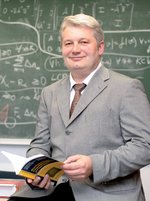
Dear Readers,
Welcome to what is now the fifth Research Report of the University of Duisburg-Essen. Thank you for your interest in learning more about our University’s research findings, which we are pleased to present in the following pages. The Report introduces you to the activities of the Main Research Areas, research centres and selected associated institutes.
At the beginning of 2011, the higher education landscape in Germany was dominated by the results of the second round of the Excellence Initiative. The proposals submitted by the University of Duisburg-Essen, although of a very high standard, may not have been successful within the Initiative itself, but the work invested in them was worthwhile nonetheless. We have fully embraced the opportunity presented by the Excellence Initiative to sharpen our research profile and extend the work of our researchers, scientists and academics in the faculties, Main Research Areas and research centres and acquire many new projects. We are consequently in a position to look back on 2011 as another year of huge successes in research. We are particularly pleased to have been able to sustain the upward trend in research funding of the past four years and secure it at a high level.
The University of Duisburg-Essen has been successful in building on its strengths, particularly among the new generation of researchers. Prof. Dr. Markus Kaiser was awarded the prestigious “Starting Independent Researcher Grant” by the European Research Council (ERC) for his research in Chemical Biology. The ERC grants are among the highest accolades in research in Europe and signify an outstanding accomplishment for the University and for the Main Research Area of Biomedical Sciences in particular. 2011 also saw the Heinz-Maier-Leibnitz Prize awarded to Dr. Moritz Kerz from the Faculty of Mathematics. Structured postgraduate training received a further boost from the acquisition of the DFG Research Training Group “Molecular Determinants of Cellular Radiation Responses and Their Significance for the Modularity of Radiation Sensitivity” and the extension of an existing DFG Research Training Group, “Transcription, Chromatin Structure and DNA Repair in Development and Differentiation”.
With a total of five Research Training Groups now working at the University of Duisburg-Essen, excellent conditions exist for early stage researchers, as the aforementioned awards and distinctions clearly reflect.
The University of Duisburg-Essen continued its successful work in the Main Research Area of Nanosciences, where construction of the new NETZ research building was launched. Plans for the establishment of the Käte-Hamburger Collegium (KHK) “Political Cultures of World Society. Opportunities for Global Cooperation in the 21st Century” were also finalised. Over the next six years, the KHK will be investigating how global processes of cooperation in a pluricultural world society can be designed to ensure effective outcomes in international negotiations. Following its official launch at the beginning of 2012, the Collegium will work in close collaboration with partners including the Main Research Area of Transformation of Contemporary Societies.
The present Report clearly illustrates how the University of Duisburg-Essen is focusing and evolving its research profile on an ongoing basis, particularly through its support of an excellent new generation of scientists in the early stages of their career. The University of Duisburg-Essen already has a very good standing in research within its Main Research Areas and can look forward to further visible successes in scientific competition in the years to come.
I hope the Research Report 2011 brings you fresh insights into the fascinating research environment at the University of Duisburg-Essen and proves to be an inspiring read.

